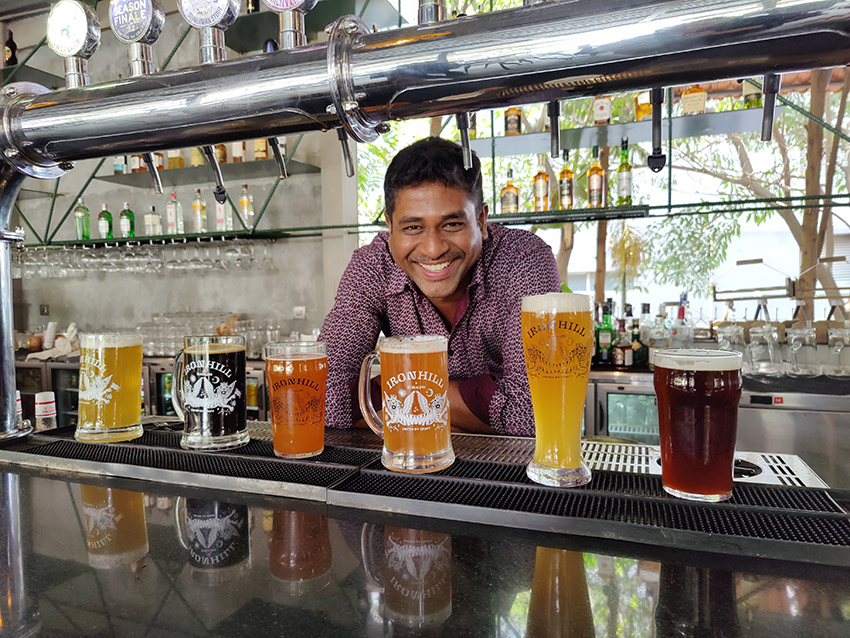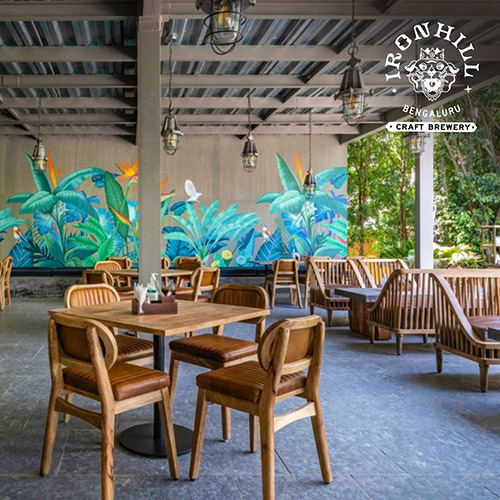On Craft Breweries and Success with Teja Chekuri, Ironhill India


PEAKLIFE gets in conversation with Teja Chekuri, Managing Partner, Ironhill India – a new age microbrewery redefining the craft beer experience.
Established in 2017, Ironhill India stemmed as the very first microbrewery of Andhra Pradesh. A seasoned restauranter and beer connoisseur himself, Teja Chekuri is the driving force of Ironhill India – having successfully expanded the brewery from Visakhapatnam, Vijayawada and Hyderabad, to recently in Bengaluru, Nellore and Rajahmundry.
Spread across a lavish 1.3 lac sq ft with 8 varieties of original craft beer and art installations at every corner, their Bengaluru outlet is the largest microbrewery in the world today. Now focusing on a unique business model of placing roots in Tier-2 and Tier-3 cities, the brand has already established a strong footing in the F&B industry with much in store for the future.
In conversation with the entrepreneur, PEAKLIFE delves into Ironhill India’s inception, its USP, future visions and more.

1. Ironhill India in Bangalore is the largest microbrewery in the world, but also has an arresting ambience and art in every corner. How did you envision this concept and what kind of response has it garnered?
Design is a core element of our DNA that I have always incorporated in all my restaurants. When people go out to dine, it is not just about the food but also the ambience, service and setting. My endeavor has always been to provide this “wow” experience throughout my projects. Every corner in each of our outlets are adorned with art and ideas that will make you sit up and take notice.
2. Establishing the brand’s presence in Tier-2 and Tier-3 cities seems like a very unique approach, especially for a microbrewery. What is the thought process behind this strategy?
If you want to succeed you have to risk traveling on the road less traveled. Our research indicated a very big gap in breweries serving customers across the country. Almost all of them were focused on Tier 1 cities. That was the eureka moment. It sparked the idea of creating breweries in offbeat and unexpected cities. We started focusing on Tier 2 cities and Tier 2 areas and started our journey from there. We invested time and energy into research and there were two very prominent findings that resonated across all the emerging markets:
One, the spending power in these cities is considerable; second, no one was catering to the mid-segment market; and third, most were well-traveled and were aware of craft beer along with what constituted a good brew.
We started with Vizag and then rolled into Vijayawada with the second. In both these cities we earned the first mover advantage and are still the only players in town. Today we are present in 4 cities in Andhra Pradesh, 1 in Hyderabad and 1 in Bangalore. All locations in each of these cities are also offbeat and had a glaring gap that needed to be addressed.
3. You are also aiming to adopt a franchisee model to open 10 outlets across four more states this year. How do you introduce your product to consumers in urban and semi-urban environments?
The first rule of any business is to never underestimate the intelligence of your consumer. We believe most of our customers in Tier-2 cities are eager to pursue new areas of experimentation. Our research and past success confirms it. With media opening up and accessible to everyone today on their fingertips, it is very unlikely that they have not heard of craft beer. We also put in a lot of effort in overall marketing so that customers are educated about our offerings and excited about it. We are currently looking at cities like Bhubaneswar, Pune and other cities in Rajasthan.
4. How do you balance your responsibilities across multiple ventures within the dynamic and crowded F&B market in two very different countries – India and the USA?
One of the most valuable pieces of advice I received when I started my entrepreneurial journey was “Hire the right people and then get out of their way.” Running a global business in two very different and diverse markets is no easy feat. In fact, all the brands I have created and run in India (Ironhill India, Prost, United Telugu Kitchens and Ishtaa) take up a good amount of my time.
I invest heavily in hiring, training and retaining the right teams. It does take effort on my part to be a part of meetings on both continents, but I love what I do so it is not a challenge to be a part of the really late-night calls or really early meets. Though I am sure my family would beg to differ.
5. Your journey from an engineering graduate to a restaurateur and now an entrepreneur is very inspiring. What is the best advice you could give to a budding entrepreneur?
Never lose touch with your customer. Your business exists to solve a need/want of a customer. Their preferences, habits and life changes must matter to you. Even today, I spend a good amount of time in the kitchen, behind the counter and interacting with customers to understand and gather feedback in real time. A lot of good ideas and solutions will present themselves when you really listen.
6. Lastly, what is your success mantra?
Work smart enough to know that hard work counts.
Be nimble enough to embrace change.
Be intelligent enough to know that sincerity and intention always matters.
More from our site
Recent Posts
Where to Sip the Best Whisky Cocktails in India
On International Whisky day, head to these restaurants to sip the finest whisky cocktails
On International Whisky day, head to these restaurants to sip the finest whisky cocktails
The New Defender OCTA: Epitome of Power, Luxury and Performance
New Defender OCTA is the most dynamically accomplished Defender ever created, with unmatched breadth of capability and performance both on- and off-road
New Defender OCTA is the most dynamically accomplished Defender ever created, with unmatched breadth of…
Shaping Tomorrow’s Golf Champions With Leela Palace Bengaluru
The 3rd edition of The Leela Golf Tournament celebrated young talent and brought together skill, precision and camaraderie!
The 3rd edition of The Leela Golf Tournament celebrated young talent and brought together skill,…
The Duo Behind Late Checkout, Redefines Hospitality
In conversation with the founders of Pawan Shahri and Nikita Harisinghani, the duo behind Chrome Hospitality Asia
In conversation with the founders of Pawan Shahri and Nikita Harisinghani, the duo behind Chrome…
Precision, Durability, and Swiss Legacy
Victorinox launches the Swiss Army collection, featuring three distinct models that emphasise exceptional quality, resistance and versatility
Victorinox launches the Swiss Army collection, featuring three distinct models that emphasise exceptional quality, resistance…
A New Era of Luxury Interiors With Sussanne & Gauri Khan
Sussanne Khan & Gauri Khan unite to bring an awe-inspiring, six-storey sanctuary of luxury, art, and design in Hyderabad
Sussanne Khan & Gauri Khan unite to bring an awe-inspiring, six-storey sanctuary of luxury, art,…

